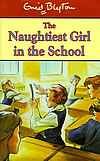
The Naughtiest Girl in the School
By Enid Blyton
I don't choose this just out of a sentimental affection for a book I read as a child, though Blyton was the archcreator of worlds I inhabited in my fantasy life. A lot of adults were scathing about Blyton's lack of stylistic complexity, but this book taught me how deeply enjoyable reading is, and that's what counts, that's what leads one to read more and—it has to be said—better books. It doesn't matter how facile the stories; if as a child you find a book that ignites the imagination, the whole of your life is enriched.
By Enid Blyton
I don't choose this just out of a sentimental affection for a book I read as a child, though Blyton was the archcreator of worlds I inhabited in my fantasy life. A lot of adults were scathing about Blyton's lack of stylistic complexity, but this book taught me how deeply enjoyable reading is, and that's what counts, that's what leads one to read more and—it has to be said—better books. It doesn't matter how facile the stories; if as a child you find a book that ignites the imagination, the whole of your life is enriched.
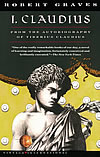
I, Claudius
By Robert Graves
I have something of an obsession with the Romans, and this is the book that gave it to me. I've never fared very well with historians, but this novel makes the early decades of the Roman Empire feel absorbingly, if frighteningly, alive. Perhaps the true gift of any historian is the ability to give the past the Technicolor vibrancy of the present.
By Robert Graves
I have something of an obsession with the Romans, and this is the book that gave it to me. I've never fared very well with historians, but this novel makes the early decades of the Roman Empire feel absorbingly, if frighteningly, alive. Perhaps the true gift of any historian is the ability to give the past the Technicolor vibrancy of the present.
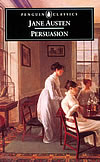
Persuasion
By Jane Austen
Everyone has their Austen, and this is mine. Sparer, more savage—and also more poignant than Pride and Prejudice, this is a novel that tells us wisely and wittily about the nature of romantic entanglements and the follies of being human. It isn't riven with the deep, muscular ironies of, say, Emma, but there is something about the dry lightness of Persuasion that is deceptive. It stays with you long after you've read it.
By Jane Austen
Everyone has their Austen, and this is mine. Sparer, more savage—and also more poignant than Pride and Prejudice, this is a novel that tells us wisely and wittily about the nature of romantic entanglements and the follies of being human. It isn't riven with the deep, muscular ironies of, say, Emma, but there is something about the dry lightness of Persuasion that is deceptive. It stays with you long after you've read it.
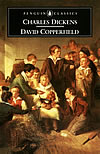
David Copperfield
By Charles Dickens
I came to Dickens relatively late in life, but in a way, I think that's the best time. When you're a child, all you see is the plum-pudding characterization and twisting-and-turning storylines, and though that is part of the juicy pleasure of Dickens, you need to be an adult to get the heartbreaking measure of his genius. And nothing shows that more, for me, than David Copperfield. It's the fullest, most breathtakingly truthful story of life—not for nothing was it Freud's favorite novel.
By Charles Dickens
I came to Dickens relatively late in life, but in a way, I think that's the best time. When you're a child, all you see is the plum-pudding characterization and twisting-and-turning storylines, and though that is part of the juicy pleasure of Dickens, you need to be an adult to get the heartbreaking measure of his genius. And nothing shows that more, for me, than David Copperfield. It's the fullest, most breathtakingly truthful story of life—not for nothing was it Freud's favorite novel.
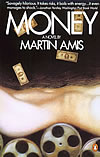
Money: A Suicide Note
By Martin Amis
I've never understood why funniness is held to be so slight a thing, as if a book that makes you laugh can only be the lightest of fictions. Martin Amis is probably the funniest of all contemporary writers, and one of the most serious, too. Money, the story of a failing filmmaker's thrashing descent into desperation, is his tour de force, and given his canon, this is saying something. Every sentence gives deep, deep pleasure.
By Martin Amis
I've never understood why funniness is held to be so slight a thing, as if a book that makes you laugh can only be the lightest of fictions. Martin Amis is probably the funniest of all contemporary writers, and one of the most serious, too. Money, the story of a failing filmmaker's thrashing descent into desperation, is his tour de force, and given his canon, this is saying something. Every sentence gives deep, deep pleasure.
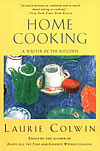
Home Cooking: A Writer in the Kitchen
By Laurie Colwin
Laurie Colwin writes about food with love, lightness and an elegant intimacy, reminding us that cooking is about life, not recipes. Her books are more than cookbooks. They are the diaries of someone who died young with a huge appetite for life and the rare ability to convey it. She writes so movingly, too, about her daughter, and I can't help think what a testimony of love Colwin has left her.
By Laurie Colwin
Laurie Colwin writes about food with love, lightness and an elegant intimacy, reminding us that cooking is about life, not recipes. Her books are more than cookbooks. They are the diaries of someone who died young with a huge appetite for life and the rare ability to convey it. She writes so movingly, too, about her daughter, and I can't help think what a testimony of love Colwin has left her.
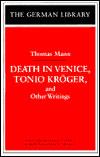
Tonio Kröger and Other Stories
By Thomas Mann
I read Tonio Kröger in my late teens, when I was going through—as many adolescents do, of course—that stormy, intense emotional phase, and the anguished worldview of Tonio Kröger just hit a chord. "Wer am meisten liebt, ist der Unterlegene und muß leiden" is a sentence I still remember, I hope not erroneously, after all those years: "He who loves the most is the inferior and must suffer." I don't believe that now, but the force of being devoured by that breast-beating melancholy hasn't left me.
By Thomas Mann
I read Tonio Kröger in my late teens, when I was going through—as many adolescents do, of course—that stormy, intense emotional phase, and the anguished worldview of Tonio Kröger just hit a chord. "Wer am meisten liebt, ist der Unterlegene und muß leiden" is a sentence I still remember, I hope not erroneously, after all those years: "He who loves the most is the inferior and must suffer." I don't believe that now, but the force of being devoured by that breast-beating melancholy hasn't left me.




